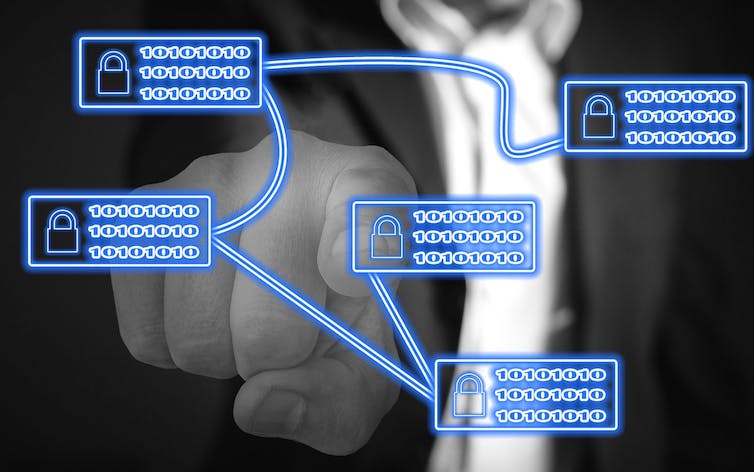What's holding back the adoption of blockchain in the enterprise?
Some researchers claim that the state of adoption of blockchain technology today is comparable to that of the Internet in the 1990s. Spread is now set to accelerate. For example, the Boston Consulting Group predicts one billion users for cryptocurrencies by 2030, which would correspond to an increase from 4% to 12.7% of users worldwide, in less than a decade.

Marroi Laaraj, University of MontpellierSamuel Fosso Wamba, TBS Education and Walid A. Nakara, Montpellier Business School
Blockchain is an information storage and transmission technology that enables people or organizations to share a common, verifiable database in real time, without the need for a trusted third party to guarantee the authenticity and integrity of the data. Blockchain functions as a kind of distributed, decentralized ledger or account book, where every transaction is recorded chronologically and verifiable through a series of cryptographic codes. This technology can be used in many fields, such as payments, smart contracts, product traceability, digital identity management and more.
As a result, morecompanies are considering switching to this technology to transform their operations and gain a competitive edge. A study by CasperLabs and Zogby Analytics of 603 corporate decision-makers, located in the US, UK and China, indicates that 90% have already implemented blockchain. The adoption curve looks set to be positive for 2023, as the study also states that 87% of companies surveyed expect to invest in the technology within the year.
A still timid use
Like the work cited above, the results of our study published in 2022 in the journal Planning Production & Control show that there is strong interest in blockchains, but the intention to adopt remains significantly higher than the actual adoption rate. The aim of this research was to understand the factors impacting blockchain diffusion, in particular by examining the role of so-called "change agents".
The study examined the responses of fourteen experts working at consultancies such as BCG, PWC, Accenture, Deloitte and Wavestone, as well as experts working at companies specializing in the development of blockchain solutions (SmartB, Consensys, Kapalt, ChainHero and Ticket 721).
These experts have identified the presence of several levers impacting the spread of this technology. Among the barriers to adoption, so-called non-technological aspects play a predominant role. Ethical and environmental concerns, as well as a lack of knowledge and expertise, are all factors slowing down adoption. As one of the experts interviewed put it:
"Today, people are still wondering what blockchain is. That's what we call bringing technologies up to date, and it'll come as we go along. Right now, we're in the process of building mental models around blockchains."
On the other hand, experts agree that, at this stage, adoption will be either transparent (i.e. unconscious) or imposed by a crisis context, such as a political or economic crisis. One expert recalls the South American precedents:
"In some South American countries where the currency is failing, such as Venezuela, the people have taken their destiny into their own hands without relying on their government and rely heavily on cryptocurrencies. Not because they're looking for innovation and new business models, but rather to save their families and protect their savings."
Essential understanding
The question of ethical responsibility is a complex and controversial one. Some of the experts we interviewed consider technology to be ethically neutral, while others take a more clear-cut view, either positive or negative.
The main issues are transparency and governance. A high level of transparency implies a high risk of exposure of private data. So, when developing a blockchain project, it is essential to consider the mode of governance, determining which actors have access to the registry, as well as the responsibility and authority of each. If the technology is misused, who is responsible?
[Nearly 80,000 readers trust The Conversation newsletter to better understand the world's major issues. Subscribe today]
The question of blockchain's environmental impact is also an important topic of debate, not least because of the use of the Proof of Work (PoW) consensus protocol. PoW requires miners to solve complex mathematical problems to create a new block. This requires significant computing power. However, more energy-efficient consensus protocols have since been developed. One possible solution is the use of Proof of Authority (PoA). PoA follows a consensus mechanism in which a small number of trusted entities are responsible for validating transactions and adding new blocks. This process is faster and less energy-intensive (although no comparative figures have been officially released).
SmartB is an example of a company developing a PoA-based blockchain. According to the company's technical experts, a PoW Ethereum transaction would consume 1,500 times more energy than a transaction carried out on the PoA-based SmartB blockchain. The company is committed to sustainable development, enabling it to significantly reduce its energy impact while guaranteeing the authenticity and security of transactions carried out on its platform.
Last but not least, understanding what blockchain is and what it can do is essential for wider dissemination. Indeed, an innovation, no matter how disruptive, must be understood to generate sufficient interest to gain acceptance and trigger the adoption, implementation and routinization phases. Without this, adoption will be either transparent (an unconscious use of blockchain through a user-focused case) or forced (a crisis situation). For a more "chosen" adoption, awareness-raising is therefore necessary, mainly provided by change agents such as consulting firms and expert start-ups.
Marroi Laaraj, PhD student, University of MontpellierSamuel Fosso Wamba, Professor of Information Systems and Data Science and Director of Research, TBS Education and Walid A. Nakara, Professor, Director of the Social Entrepreneurship and Inclusion Chair, Montpellier Business School
This article is republished from The Conversation under a Creative Commons license. Read theoriginal article.